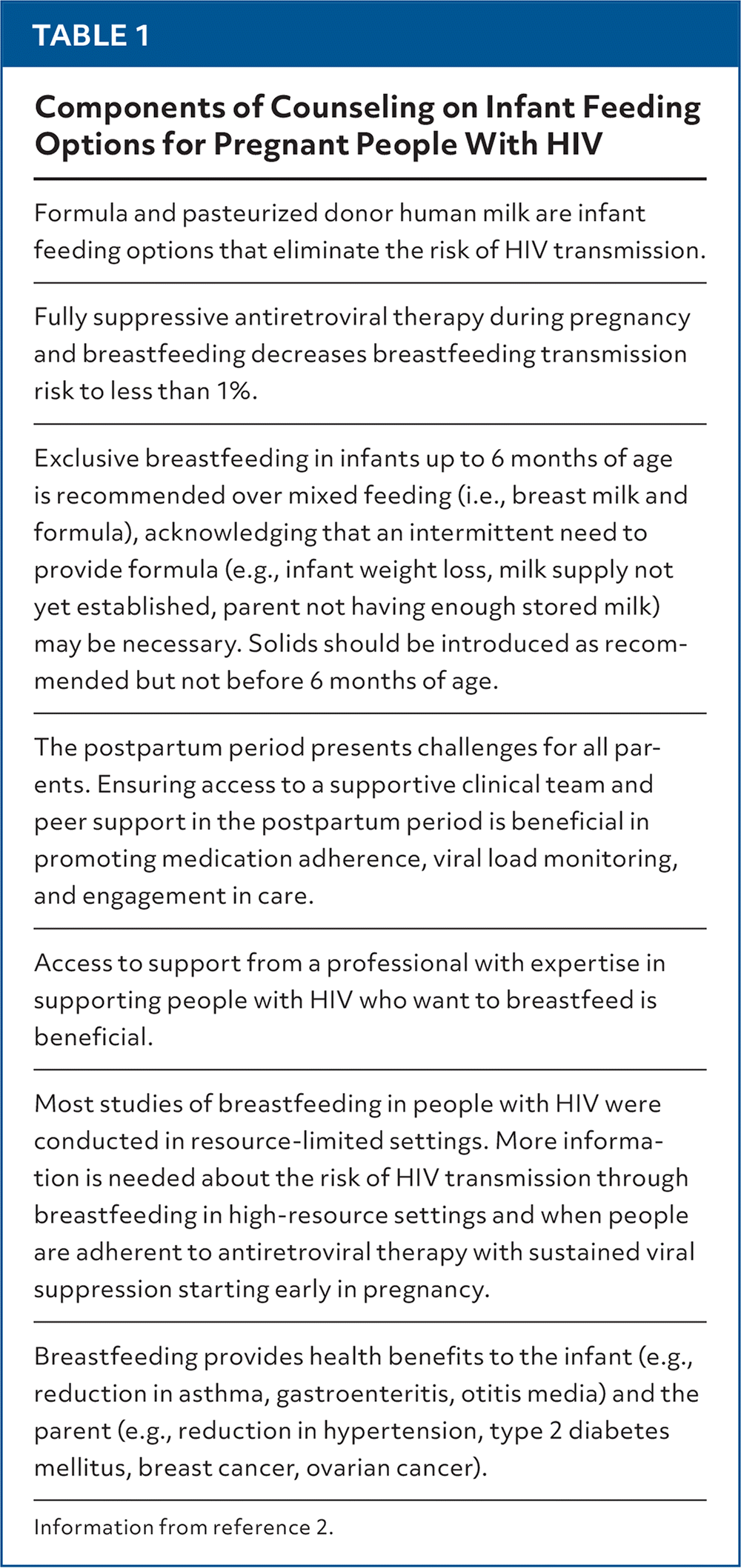
Am Fam Physician. 2024;110(2):115-116
Author disclosure: No relevant financial relationships.
To the Editor:
In Dr. Ramírez’s article, maternal HIV is identified in Table 2 as a contraindication to breastfeeding.1 The recommendation has been updated in the U.S. Department of Health and Human Services Recommendations for the Use of Antiretroviral Drugs During Pregnancy and Interventions to Reduce Perinatal HIV Transmission in the United States.2 The guideline states, “Individuals with HIV on ART [antiretroviral therapy] with a consistently suppressed viral load during pregnancy (at a minimum during the third trimester) and at the time of delivery should be counseled on the options of formula feeding, banked donor milk, or breastfeeding,” and that those “…who choose to breastfeed should be supported in this decision.”2
The updated recommendation was developed with input from community members, including those living with HIV while breastfeeding. It is based on the recognition that the risk of lactational HIV transmission with viral suppression on antiretroviral therapy is less than 1% and that people with HIV desire and deserve autonomy in making this decision.2 The recommendation reflects a meaningful change in how clinicians should counsel people with HIV about their infant feeding options.
Living with HIV is no longer a contraindication to breast/chestfeeding. Physicians treating patients with HIV have an opportunity to provide person-centered, evidence-based counseling, which allows for informed decision-making. Counseling should start prenatally with a care team that has developed a trusting, therapeutic relationship with the pregnant person and include information about the risk of HIV transmission, benefits of human milk, and importance of sustained postpartum viral suppression. Counseling should be noncoercive.
Involving child welfare agencies is an inappropriate response to the infant feeding choices of a person with HIV. Clinicians should be aware of potential biases because referrals to these agencies are made disproportionately for people of color and families with public insurance.3 Table 1 lists recommendations for counseling.2 For more resources, pregnant patients and their families can visit the Well Project. Clinicians with questions about infant feeding for patients with HIV are encouraged to consult the National Clinician Consultation Center’s Perinatal HIV Hotline at 888-448-8765.

| Formula and pasteurized donor human milk are infant feeding options that eliminate the risk of HIV transmission. |
| Fully suppressive antiretroviral therapy during pregnancy and breastfeeding decreases breastfeeding transmission risk to less than 1%. |
| Exclusive breastfeeding in infants up to 6 months of age is recommended over mixed feeding (i.e., breast milk and formula), acknowledging that an intermittent need to provide formula (e.g., infant weight loss, milk supply not yet established, parent not having enough stored milk) may be necessary. Solids should be introduced as recommended but not before 6 months of age. |
| The postpartum period presents challenges for all parents. Ensuring access to a supportive clinical team and peer support in the postpartum period is beneficial in promoting medication adherence, viral load monitoring, and engagement in care. |
| Access to support from a professional with expertise in supporting people with HIV who want to breastfeed is beneficial. |
| Most studies of breastfeeding in people with HIV were conducted in resource-limited settings. More information is needed about the risk of HIV transmission through breastfeeding in high-resource settings and when people are adherent to antiretroviral therapy with sustained viral suppression starting early in pregnancy. |
| Breastfeeding provides health benefits to the infant (e.g., reduction in asthma, gastroenteritis, otitis media) and the parent (e.g., reduction in hypertension, type 2 diabetes mellitus, breast cancer, ovarian cancer). |
Editor’s Note: This letter was sent to the author of “Prenatal Care: An Evidence-Based Approach,” who declined to reply.
